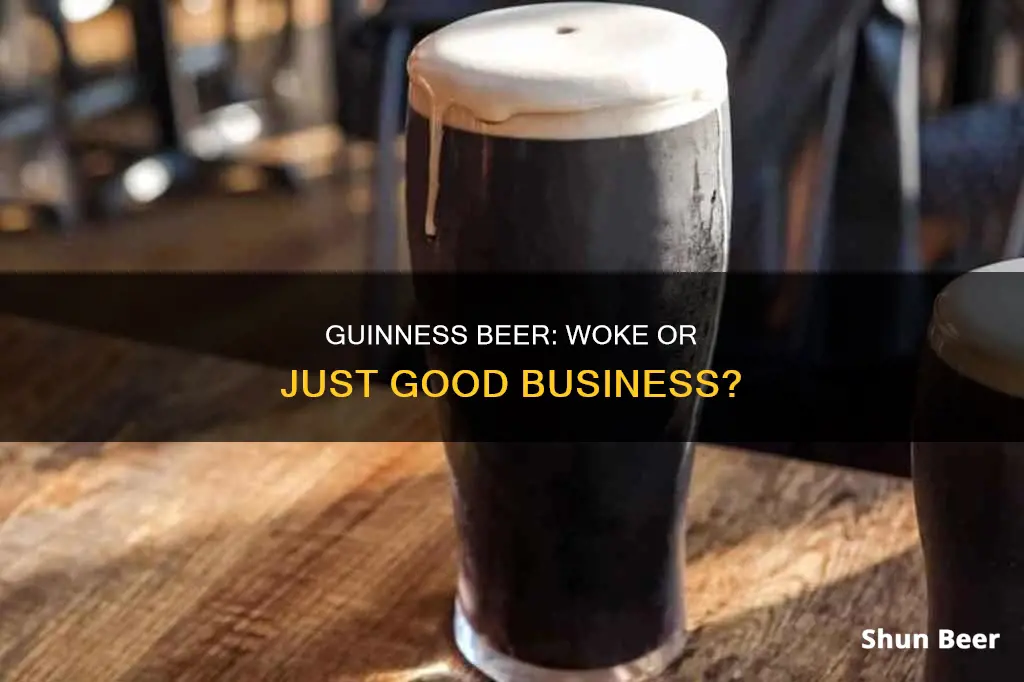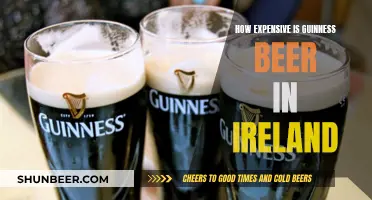
Guinness is a stout that originated in Dublin, Ireland, in the 18th century. It is now owned by the British-based multinational alcoholic beverage maker Diageo and is one of the most successful alcohol brands worldwide. In recent years, Guinness has made efforts to stay relevant and inclusive, such as introducing a non-alcoholic version, Guinness 0.0, and removing isinglass from their brewing process to make their beer vegan-friendly. However, they have also faced some backlash, such as accusations of disrespecting diversity in an ad campaign for the Six Nations rugby tournament. With a long history and a global presence, Guinness has become much more than just a beer, and its actions are scrutinized by drinkers and non-drinkers alike.
| Characteristics | Values |
|---|---|
| Owner | Diageo |
| Origin | St. James's Gate Brewery, Dublin, Ireland |
| Year of Origin | 18th century |
| Current HQ | London, UK |
| Year Moved HQ to London | 1932 |
| Founder | Arthur Guinness |
| Year of Founder's First Brew | 1759 |
| Year of First Export | 1769 |
| Year of Dark Beer Porter Launch | 1778 |
| Year of First Use of Term "Stout" | 1840s |
| Year of Merger with Grand Metropolitan | 1997 |
| Year of Closure of Park Royal Brewery | 2005 |
| Year of Launch of Non-Alcoholic Guinness | 2020 |
| Immigrant-Friendly | Yes |
What You'll Learn

Guinness's advertising campaigns
In 1998, Guinness launched an advert featuring a clash between a surfer, water, and horses. The advert had nothing to do with the product itself but focused on powerful cinematography and an emotional feeling of achievement. The campaign ended with the slogan, "Good things come to those who wait."
In 2014, Guinness ran a campaign centred on the Sapeurs, or the Society of Elegant Persons of Congo. The advert featured Congolese men going through their workday and ending their day by dressing up and attending a Sapeurs event, dancing and enjoying drinks. This advert promoted the idea that these men were more than what they seemed during their daily lives, and it ended with the quote, "Made of More."
Another notable campaign promoted Guinness's Black Lager using a 30-second advert with short, snappy clips of Martians, quotes, Guinness branding, and a battle scene, set to Kanye West's song, BLKKK SKKKN HEAD. The campaign also used the hashtag #MadeOfBlack on social media.
Guinness has a long history of marketing campaigns, from television advertisements to beer mats and posters. The most recognisable series of advertisements was created by S. H. Benson's advertising agency in the 1930s and 1940s, with posters featuring phrases like "Guinness for Strength," "Lovely Day for a Guinness," and "My Goodness My Guinness." These adverts often featured distinctive artwork by John Gilroy, including animals such as kangaroos, ostriches, seals, and the now-iconic toucan.
In the late 1980s and early 1990s, a series of humorous adverts featuring actor Rutger Hauer and centred on the theme "Pure Genius" extolled the qualities of Guinness.
In 2000, Guinness's "Surfer" advertisement was named the best television commercial of all time in a UK poll. This advert was inspired by the famous 1980s Guinness TV and cinema ad, "Big Wave," which featured a surfer riding a wave and a bikini-clad sunbather taking photographs.
Guinness has also run campaigns with specific focuses, such as the Michael Power campaign in Africa, which became one of the best-known alcohol advertising campaigns on the continent. Similarly, the Adam King campaign in Asia featured taglines like, "Everyday someone, somewhere achieves something new," and helped Guinness rank among the top three beer labels in Singapore and Malaysia.
Guinness: A Manly Beer or Just Dark, Foamy Liquid?
You may want to see also

Guinness's sales and popularity
Guinness is one of the most successful alcohol brands worldwide, brewed in almost 50 countries and available in over 120. The brand is worth approximately four billion US dollars, making it one of the most valuable and widely recognisable beer brands globally.
In 2011, Guinness sales amounted to 850,000,000 litres. Despite declining consumption since 2001, Guinness is the best-selling alcoholic drink in Ireland, where the brewery makes almost €2 billion worth of beer annually. It is also the third most popular Guinness-drinking nation after the UK and Ireland. In 2010, the US consumed more than 950 million hectolitres of Guinness.
In 2017, Guinness experienced an eight percent net sales growth worldwide, compared to only two percent the year before. However, the COVID-19 pandemic in 2020 saw Guinness hit with a sales decline of 16 percent compared to the previous year. In North America, sales declined by around five percent.
In 2023, Guinness reported a one percent net growth in global sales volume compared to the previous year. This was the lowest volume growth for the brand in the previous three years.
Guinness is now the best-selling beer in the UK, accounting for one in every nine pints pulled in pubs. Sales increased by 19 percent across Europe in 2022, while a YouGov survey recently crowned it the nation's most recognised and popular beer brand.
Guinness has a significant share of the African beer market, where it has been sold since 1827. About 40 percent of worldwide total Guinness volume is brewed and sold on the continent, with Foreign Extra Stout the most popular variant. Three of the five Guinness-owned breweries worldwide are located in Africa.
In 2017, Guinness teamed up with AB InBev to distribute Guinness in mainland China.
Guinness Beer and Keto: Is It a Match?
You may want to see also

Guinness's ingredients and brewing process
Guinness is a stout that originated in the brewery of Arthur Guinness at St. James's Gate, Dublin, Ireland, in the 18th century. The company still uses the same ingredients and traditional brewing steps to brew the perfect pint. The four key ingredients to brew Guinness are roasted barley, malted barley, hops, yeast, and water. The flavour of Guinness comes from malted barley and roasted unmalted barley. The unmalted barley is a relatively modern addition that became part of the grist in the mid-20th century.
The brewing process begins with mashing, where the milled barley is combined with hot water, forming a mash. Next, it's boiled with hops in a process called lautering. After boiling, the resulting liquid called ‘wort’ is cooled and transferred to fermentation vessels. Yeast is added, and fermentation occurs. The beer then undergoes maturation to develop its flavours. Before packaging, the beer is nitrogenated, which provides its iconic creamy mouthfeel.
The draught beer's thick, creamy head comes from mixing the beer with nitrogen and carbon dioxide. The nitrogen is less soluble than carbon dioxide, which allows the beer to be put under high pressure without making it fizzy. The perceived smoothness of draught Guinness is due to its low level of carbon dioxide and the creaminess of the head caused by the very fine bubbles that arise from the use of nitrogen and the dispensing method.
Guinness Beers: Exploring the Diverse Range of Stouts
You may want to see also

Guinness's social impact
Guinness has a long history of philanthropy, with founder Arthur Guinness known for his charitable donations and public life outside of the brewery. This legacy has been continued by subsequent generations of the Guinness family, with donations to St. Patrick's Cathedral, the establishment of trusts to provide homes for the poor, and the development of public spaces and infrastructure.
Guinness Nigeria's sustainability strategy is focused on social responsibility, alcohol in society, and reducing environmental impact. The company provides youth development programmes, supports improved eye care and healthcare, and promotes sustainable farming practices through its Water of Life initiative.
The Guinness Storehouse in Dublin, Ireland, is committed to sustainability and reducing its environmental impact. The Storehouse has received a gold award from Green Tourism and sources 100% of its electricity from renewable generation. They track water usage, update heating systems, and measure waste production to reduce their ecological footprint.
Guinness also embraces diversity and inclusion across its business, partners, and communities. They partner with organisations such as Learning for Life, St. Michael's House, and Junior Achievement to foster a more inclusive culture and shape a tolerant society.
Overall, Guinness has a rich history of social impact, from the philanthropy of its founder to its modern-day sustainability and community engagement initiatives. The company aims to create a positive effect on people, communities, customers, suppliers, and the planet.
Guinness Beer: Wheat-Free, But What's the Secret?
You may want to see also

Guinness's response to criticism
Guinness has been at the centre of criticism for its "woke" values, with some consumers threatening to boycott the brand. In response to this, Guinness has stood by its values, with a long history of philanthropy and support for the LGBTQ+ community.
Guinness has a long history of marketing campaigns, from television advertisements to beer mats and posters. The brand has always aimed to be inclusive, with slogans such as "Guinness for Strength", "Lovely Day for a Guinness", "Guinness Makes You Strong", and "Guinness Is Good for You".
In recent years, Guinness has continued to embrace its inclusive values, with LGBTQ+ themed bar gear and an advert for Welsh rugby player Gareth Thomas about coming out. The brand has also shown support for gay rights, with the Guinness Storehouse at St. James's Gate Brewery in Dublin becoming a popular tourist attraction, attracting over 1.7 million visitors in 2019.
Guinness has also been praised for its welfare schemes for employees, which date back to the early 1900s. The brand provided pensions, free meals, healthcare, and subsidized housing for its workers, as well as establishing a trust to provide housing for the poor in Dublin and London.
In response to the criticism, Guinness has continued to stand by its values, with no sign of changing its marketing or inclusive stance. The brand has not released an official statement regarding the criticism, but its actions speak for themselves, with a continued commitment to inclusivity and support for marginalized communities.
Guinness Beer: High Iron Content or Just a Myth?
You may want to see also
Frequently asked questions
I cannot say whether Guinness beer is woke or not, but I can provide some information for context. In 2024, Guinness was accused of disrespecting diversity with a series of advertisements for the Six Nations rugby tournament. The company apologised and said they would replace the billboards within days. In 2020, Guinness launched a non-alcoholic version of its famous stout, which provides consumers with a low-calorie option.
The billboards in question were placed around Dublin ahead of Ireland's opening match of the Six Nations tournament against England. They read, "You don't pick a side. Your grandparents have done that already". Journalist Mark Tighe and the Immigrant Council of Ireland criticised the company for failing to recognise the "huge benefit our diversity brings".
Some people agreed with the criticism, with one person on Twitter saying, "Methinks Guinness should read their own history before making an assumption about grandfathers". However, others disagreed, with a Twitter user saying, "I think it's a brilliant ad! No offence taken as it doesn't mention race, colour or creed, it could be anyone's grandparents couldn't it".
Guinness issued an apology and said they would replace the billboards within days. A spokeswoman for the parent company Diageo said, "It was to convey the passion with which people follow the team they support, be it because of where they were born, where they live or familial ties... we regret if the billboard caused offence or confusion. This was absolutely not our intention."
In 2020, Guinness launched a non-alcoholic version of its stout, which could be considered inclusive to those who do not consume alcohol. The drink is made using the same ingredients as the alcoholic version but with the alcohol removed through a cold filtration method.







